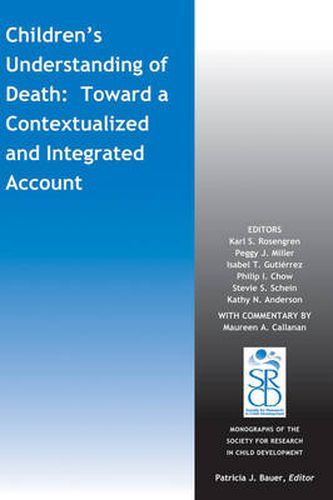Readings Newsletter
Become a Readings Member to make your shopping experience even easier.
Sign in or sign up for free!
You’re not far away from qualifying for FREE standard shipping within Australia
You’ve qualified for FREE standard shipping within Australia
The cart is loading…






In this monograph we (1) provide an account of young children’s socialization with respect to death and (2) develop a conception of children’s understanding of death that encompasses affective and cognitive dimensions. Conducted in a small city in the Midwest, the project involved several component studies employing quantitative and qualitative methods. Middle-class, European American children (3-6 years, N = 101) were interviewed about their cognitive/affective understandings of death; their parents (N = 71) completed questionnaires about the children’s experiences and their own beliefs and practices. Other data included ethnographic observations, interviews, focus groups, and analyses of children’s books. Parents and teachers shared a dominant folk theory, believing that children should be shielded from death because they lack the emotional and cognitive capacity to understand or cope with death. Even the youngest children knew basic elements of the emotional script for death, a script that paralleled messages available across socializing contexts. Similarly, they showed considerable understanding of the subconcepts of death, providing additional evidence that young children’s cognitive understanding is more advanced than previously thought, and contradicting the dominant folk theory held by most parents. Although children’s default model of death was biological, many children and parents used coexistence models, mixing scientific and religious elements. A preliminary study of Mexican American families (children: N = 27, parents: N = 17) cast the foregoing fi ndings in relief, illustrating a different set of socializing beliefs and practices. Mexican American children’s understanding of death differed from their European American counterparts’ in ways that mirrored these differences.
$9.00 standard shipping within Australia
FREE standard shipping within Australia for orders over $100.00
Express & International shipping calculated at checkout
In this monograph we (1) provide an account of young children’s socialization with respect to death and (2) develop a conception of children’s understanding of death that encompasses affective and cognitive dimensions. Conducted in a small city in the Midwest, the project involved several component studies employing quantitative and qualitative methods. Middle-class, European American children (3-6 years, N = 101) were interviewed about their cognitive/affective understandings of death; their parents (N = 71) completed questionnaires about the children’s experiences and their own beliefs and practices. Other data included ethnographic observations, interviews, focus groups, and analyses of children’s books. Parents and teachers shared a dominant folk theory, believing that children should be shielded from death because they lack the emotional and cognitive capacity to understand or cope with death. Even the youngest children knew basic elements of the emotional script for death, a script that paralleled messages available across socializing contexts. Similarly, they showed considerable understanding of the subconcepts of death, providing additional evidence that young children’s cognitive understanding is more advanced than previously thought, and contradicting the dominant folk theory held by most parents. Although children’s default model of death was biological, many children and parents used coexistence models, mixing scientific and religious elements. A preliminary study of Mexican American families (children: N = 27, parents: N = 17) cast the foregoing fi ndings in relief, illustrating a different set of socializing beliefs and practices. Mexican American children’s understanding of death differed from their European American counterparts’ in ways that mirrored these differences.